Walking on the red carpet in Nepal
/ Encountering God on the missionary frontline /
Photo courtesy/Wu Xinhui
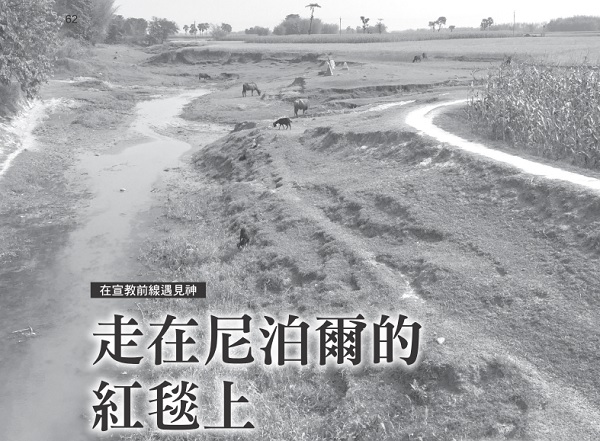
"Mommy, when you grow up, I might just treat you and Daddy to McDonald's."
"Why can we only treat us to McDonald's?"
"Because I want to be an archaeologist and look for dinosaur bones. The teacher said that this kind of work can only make a small amount of money, so I may not have any money. And it may take a long time to go home because I have to go to a very far place."
When the second child, Jimin, was in the first grade of elementary school, he told me his ambition when he grew up, saying that he wanted to work somewhere far away. When he was twelve years old, he signed up for a crab research summer camp. He camped on the coast of Maryland every day and followed the fishing boats to catch crabs for three weeks. At the age of thirteen, he went to summer classes at the Polytechnic University of Mexico to learn rocket and robot manufacturing courses. When he was sixteen, he attended a leadership course to discuss urban poverty. The son's vision expanded from the study of reptilian environments and robots to the issue of human poverty. Jimin, who majored in biology at university, applied for the school's HNGR program (Human Needs and Global Resource, Global Resources and Human Needs Research Course) in his junior year. In his senior year, he went to the health clinic in Guisan Town, Palawan Island, Philippines. Internship for half a year.
After graduating from school six months after returning to the Philippines, Jimin was sent by the Mennonites to do research work in Biratnagar, southern Nepal, for one year. He went to what is known as the second largest city in Nepal and worked with the church construction cooperation ministry established by the local church. He helped remote, poor and resource-less villagers reclaim farmland, divert water for irrigation, provide basic medical assistance, visit the villagers, and teach health and nutrition. Waiting for education. He must also record the results of the ministry, evaluate the feasibility and effectiveness of all strategies, and provide improvement guidelines for the local government and the agencies it takes over to continue to help villagers achieve a basic standard of living.
My son's ambitions are becoming clearer and clearer, but he is also getting further and further away from home, and the opportunities to treat us to McDonald's are becoming less and less. We regularly talk on the phone every week. My son says everything is fine and he is working hard to learn Nepali and get used to eating with his hands. Next, he said that due to political factors, India stopped supplying oil to Nepal, the entire country had power cuts, new political parties were in conflict with the Indian government, and there were riots in some areas. My son called on everyone to pray for Nepal on Facebook. Nepal has been devastated by the previous major earthquake and the subsequent oil shortage.
Living on the east coast of the United States, I often ask my son whether he has enough food and clothing, whether he has been bitten by mosquitoes and has dengue fever, how to charge the battery when there is no electricity, and other pediatric mother questions. My son was annoyed by our questions and said on the other end of the phone: "Daddy, Mommy, do you want to come to Nepal to see what I am doing?" So, we brought toilet paper, disinfectant, medicine, masks, batteries, etc. and took a ride. Get on a plane, circle half the world, fly to Nepal, and explore thousands of miles away.

▲A once-in-a-lifetime travel experience, a journey of gratitude and gaze.
An ancient cultural country where people are looking for living space
At night, we arrived in Kathmandu. The weather at the end of March was warm and cool in spring. My son, whom I had not seen for a long time, looked even taller and darker in the dim lights outside the airport. Listening to him speaking Nepali to the driver, sitting in an old taxi and walking through a dark city, I had no time to digest the impact of this strange place.
Garbage recycling is one of the biggest challenges for the Nepali government. Although there are many NGOs (non-governmental organization assistance groups) willing to assist Nepal's health units in garbage collection and treatment, many health policies are affected by politics, economics and religious beliefs. It cannot be executed either. Residents pile garbage at the door or dump it in open spaces. There are piles of garbage everywhere. Residents burn garbage at will. Coupled with the black smoke emitted by vehicles, Nepal's air pollution is among the highest in the world.
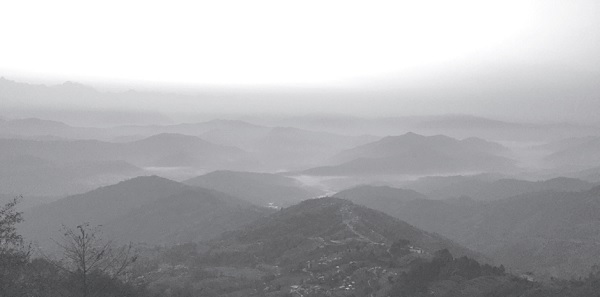
▲The mountains of Nepal at sunrise are breathtaking.
Kathmandu is the first stop for most tourists in Nepal. During my two days in Kathmandu, I navigated through disorderly traffic jams, tourist crowds, and piles of garbage. Sitting on the rooftop balcony, looking at the ancient palace and the bustling crowds in front of me, I thought to myself: "What is God's blessing to this place?"
It takes nine to ten hours to drive from Kathmandu to Biratnagar in the southeast, but it only takes half an hour to fly. When the oil supply was tight, my son took a night bus in order to apply for a visa in Kathmandu. He had to pass the checkpoint every few hours, wait several hours for refueling, and wait for the driver to rest and wake up before setting out on the road... He arrived at his destination. It's twenty-eight hours later.
I saw the Himalayas from a distance on the plane and felt the wonder of the Creator. In such a beautiful country with mountains and rivers, the people are poor and the government is powerless and ineffective. Millions of tourists from foreign countries admire the beauty and majesty of the mountains and challenge the limits of climbing the peaks. However, most of them only cast a prying tourist eye on the country's backwardness and poverty. There are also people who come to look for Indian masters, like setting foot in a cultural secret, hoping to find a spiritual resting place in primitive simplicity.
In a chaotic urban area, through the rising dust and black smoke, I watched Nepalese people trapped in the chaos of trucks, taxis, motorcycles, cattle, and dogs trying to find a passable road. In the mountains, young girls wear brightly colored sari (Sari), rub their hands and feet with kodan, and are gorgeously dressed, but their eyes reveal innocence and clarity. I was panting and resting with my arms akimbo, and they passed me by with smiles on their heads carrying bamboo baskets filled with stones. Nepalese people cope with the chaos of life calmly and face the burdens of life with a smile. I look at them not with sympathy, but with respect - respect for them for finding ways to survive with a smile in the extremely limited feasible space and available resources. A piece of heaven and earth.

▲The traffic in Kathmandu is chaotic, but it seems that everyone can find a way.
VIP treatment
The plane arrived in Biratnagar under the setting sun. Jamin introduced a young couple who came to pick us up. Under the attention of everyone, they presented us with flowers as if they were welcoming dignitaries. I had just gotten off the plane, my hair was messy, I was holding a bouquet of flowers and pulling out my luggage. Under everyone's gaze, I took a photo with them in disgrace.
Biratnagar has power rationing every day. In the dim light, we had dinner with co-workers from BIC (Brethren in Christ) church. Dinner was egg curry and rice. Nepali people are very hospitable and specially brought us a large plate of rice, curry and three eggs (for one person), and also thoughtfully prepared spoons for me. My husband followed the local customs when he arrived, learning from his son to eat with his hands, and experiencing the differences in Nepalese food.
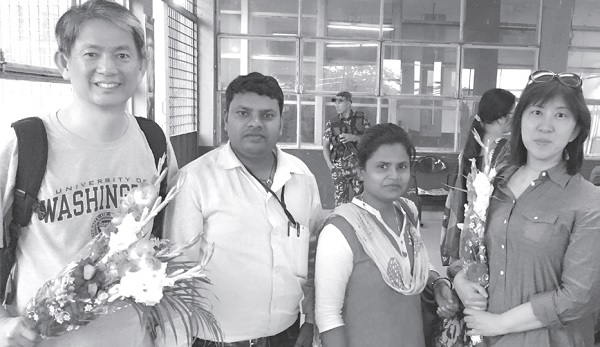
▲The VIPs who first arrived in Biratnagar (the author and his wife, first from left and first from right).
After a hearty meal of "mountain" rice and three curry eggs, we walked to the hotel in the dark with full stomachs. In the darkness, with the help of the tiny light from my iPhone, I crossed potholes, avoided garbage dumps, and walked around the wild dogs sleeping on the roadside, and walked back to the hotel slowly and tremblingly. "Your word is a lamp to my feet and a light to my path" (Psalm 119:105). In the pits of life and the overwhelming messages, if you fail to walk in the light of God, how can you find the truth? The true path of life? When I returned to the hotel, I saw bright lights, air conditioning, hot water, WiFi facilities, and mosquito repellents in the room. However, since the battery could only provide lighting and sockets, without power, having everything means nothing. No.
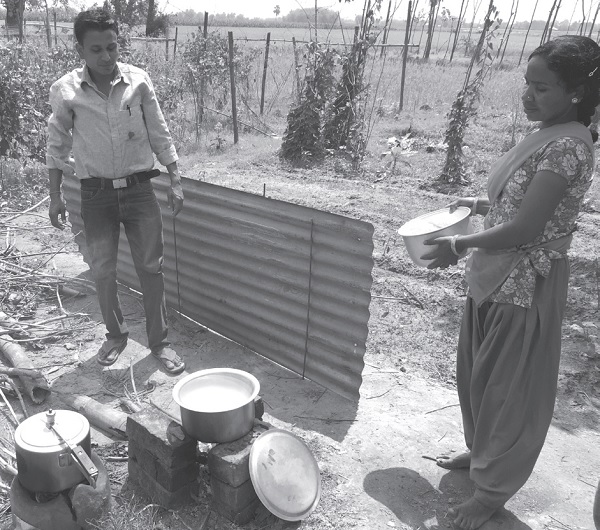
▲The kitchen of the village BIC service center is outdoors, and employees prepare lunch for the author and his wife.
Inaccessible villages
The BIC church cooperates with the Mennonite Central Committee (MCC-Mennonite Central Committee) in the United States to rent a piece of farmland in the village of Bhatigachh, near the border of Nepal and North India, and guides the villagers in crop cultivation and planning, helping the villagers to become self-reliant. BIC also sets up service centers and small pharmacies at the interface between farmland and villages. The center provides tailoring and nursing classes for women in the villages to learn skills. The senior pastor of BIC Church, Shemlal Hermbromg, is the most educated community leader in the local area. He also grew up in the village of Bhatigachh and has a deep understanding of the importance of education. He often goes to the villages to appeal to parents to allow their children to receive education or learn skills.
The farmland project is in its third year, and Jimin is the first counselor sent from the Mennonite Mutual Aid Promotion Society in the United States. The counselor must live in the local area for a long time, practice farming with the villagers, and understand the villagers’ living habits. Make practical assessments and make recommendations for improvements.
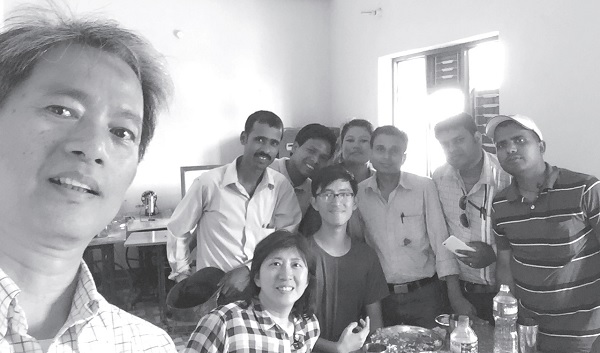
▲The author (sitting in front) took a photo with the friendly and lovely BIC employees.
We set off from BIC's church in the city early in the morning. Jimin and his husband rode bicycles first. My caring son knew that I couldn't "control" the fifty-minute bicycle ride, so he specially asked his colleague Ya Rui to take me there on his motorcycle. Ya Rui was young, funny and nonsensical. He took the cookie gift box I brought, hung it next to the tire, fought his way through the chaotic traffic in the city, and reached the loess road. He said, "From here on, it's very difficult to ride. It’s very difficult…”
The motorcycle was traveling slowly on a loess road ridge less than five feet wide. There were sunken loess gullies on both sides. The road ridge was uneven, just like the motorcycle extreme challenge scene on TV. However, the loess road in front of me was endless and arid farmland. There are only a few crops, and skinny cattle and sheep stand on the ridge of the road and between the road ditches. How long does it take to ride to the BIC service center? "Half an hour! It's very difficult. The car can't drive in, and the motorcycle will have a puncture if you ride it for a long time. No one will want to come. It's very difficult..." I can't imagine the hard work that Jimin has to do three times a week.
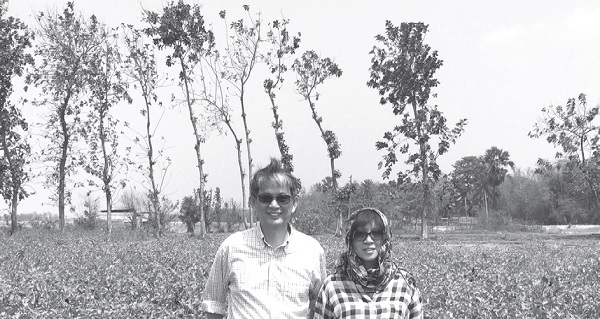
▲The author and her husband are standing in the field where their son Jieming works, enjoying the wind.
Walking to the farmland planned by BIC, I finally saw a green space in a dry and waterless yellow land, with green peppers, luffa, eggplant, water spinach, corn, cabbage and other crops planted. A BIC co-worker said: "We hired agricultural technicians to teach the villagers how to farm. After harvesting, they can eat or do business. The open space outside the center becomes the village's market on weekends, where people set up vegetable stalls, get haircuts, forge iron and sharpen knives, etc. Villagers no longer have to walk half a day to buy groceries or see a doctor, as simple medical equipment is available here to treat common colds and wounds.”
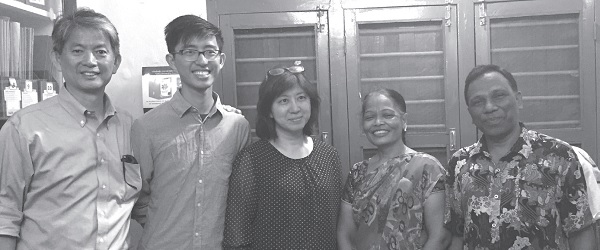
▲The BIC senior pastor and his wife (first and second from right) are the most respected community leaders in the local area.
The village chief's treasure
Jieming arranged for the staff to take us into the village on friction vehicles. This place is more remote and backward than the countryside along the loess road ridge, and there is no electricity at all. After passing the muddy loess path and then crossing the narrow suspension bridge, the car finally stopped in front of a house.
A tall and thin man wearing a lungi (Longqi-Nepal belly-length skirt) emerged from the small thatched house. Jimin said he was the village chief. "We think he is the village chief, because most of the villagers obey his words, and the hut is the grocery store he runs." Following the village chief, we climbed over a hill and saw a cute little pond in the bamboo forest. "This is a man-made pond. We help them dig soil, divert water, and provide fish fry. When the fish grow up, they can be used as food and sold in small markets. There has been little rain this year, and the water level in the pond is low." Jimin Pointing to the pond to explain, the children in the village gathered around us to watch the fun. The children looked at our every move with deep curiosity. I was attracted by their beautiful eyes. Under the watchful eyes of a group of children, we listened to the village chief discussing the recent harvest with BIC colleagues. Ya Rui introduced the two men who had just arrived: "The CEO and the deputy CEO."
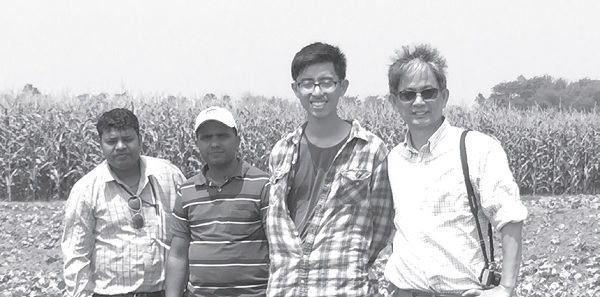
▲The author’s husband and son took a group photo with colleagues in the farming project.
The village chief said he had something good to entertain us. He took out a gray-black plastic bucket from the thatched hut, took out a few iron cups, rinsed it with well water, poured out the transparent liquid from the bucket, and invited us to enjoy it. Under the envious eyes of the children and the CEO and deputy CEO, I hesitantly drank this glass of unknown liquid that looked like water. It was as sweet as syrup but tasted like fermented betel nut. I smiled and held my head while I was shaking slightly. I saw them filling my husband's cup again.
The two of us looked at each other, and he gave us a look that said, "I must drink it all with patience." The son sitting next to him drank his second cup easily and said: "Last time I came here with MCC leader Martha, followed by a group of children. No one in the village had ever seen a foreigner with blond hair. The village chief asked me She drank the sap that had been fermented for a week. "It's okay!" It turns out that the unknown liquid is sap quenched from a tree in front of the small hut, and it is the village chief's treasure!
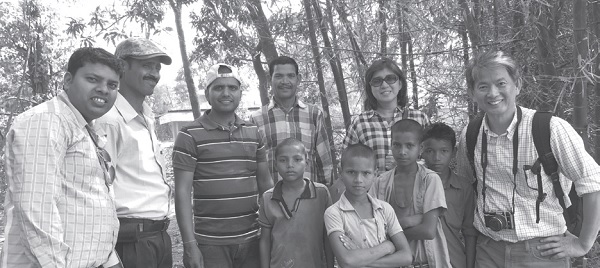
▲Taking a photo with the village chief (third from right behind) and co-workers by the pond.
new experience
It is not easy to reach Nepal, and the journey back to the United States is also long. For example, waiting for the plane to refuel in India and waiting for the connecting flight in Saudi Arabia are all tests of patience and physical strength. While waiting, I reflected on my experience in Nepal and came away with two thoughts.
The call to become flesh comes from God: My son’s long journey to the farmland three times a week makes me sad the most, but he said: “It doesn’t feel hard! I enjoy it, this is what I want to do.” He loves food. He once used sashimi and sushi as the research topic on food culture in his school thesis; but in the living environment of Nepal, there is no car or electricity, so he eats two meals a day and can only eat two meat-based meals a month. , mosquitoes inhabited the mosquito nets densely, and he was happy with such days, because God gave him a heart to discover goodness in poverty. This kind of long-term commitment and joy cannot be cultivated by tutoring, Sunday school or other education. It is a deep calling and burden placed in his heart by God. This burden is love, mercy and joy.
Not only Jimin, but also the missionaries stationed in Nepal. They live in a foreign land and have inconveniences and difficulties such as language, culture, and food. However, the love in their hearts far exceeds these difficulties. This trip gave me a little taste of Heavenly Father’s heart. On the day we parted, Jimin suffered from vomiting and fever all night. I couldn't take care of him, so I could only say goodbye to him at his bedside. Holding back tears, I walked on the muddy path with my luggage, praying secretly in my heart: "Heavenly Father, please heal and take care of Jimin. Thank you for allowing Jimin to be surrounded by many co-workers who are like angels. Thank you for letting you I can understand your heart a little bit."
The Kingdom of God has come to all parts of the world in various ways: Although the political parties changed last year and the new constitution has allowed people the freedom to choose religion, the Nepali government still issued an official document to various Christian organizations in March this year, prohibiting them from preaching the gospel. How to preach in such a religious environment?
Shemlal Hermbromg, the senior pastor of BIC, has been engaged in local community service and village improvement ministry for many years. He grew up in a poor village and used his first experience to encourage villagers to get education. He established Spice House in Biratnagar to take in students who had left their homes in the village to study in the city, and found sponsors for them so that young people could have the opportunity to receive education.
The church’s farming progress project helps villagers in poor villages obtain farming harvests with very few resources. This is a real action of loving one’s neighbor. “For I was hungry and you gave me something to eat, I was thirsty and you gave me something to drink, I was a stranger and you welcomed me in, I was naked and you clothed me, I was sick and you visited me, I was in prison and you gave me something to drink. , come and see me... If you have done these things to one of the least of these my brothers, you have done them to me.” (Matthew 25:35-40)
There are missionaries praying for homeless people who are drunk and drug addicts in the red light district of Kathmandu, allowing those who are mentally ill or illiterate to see signs and wonders or experience miraculous healing from Heavenly Father. There are missionaries in remote villages, providing food for extremely poor villagers and cultivating their ability to make a living. I see the Kingdom of God coming in different ways everywhere.
A few days before setting off for Nepal, a pastor wrote a prayer for my journey: "Lord of grace, please hide this sister under your wings and keep her safe. You also want to take her out of her comfort zone, So she can see what You are doing. If she is tired or feeling uneasy, You will give her comfort and rest, whether she deserves it or not. Put a red carpet in her path for her to sit on. In first class..."
Yes, God rolled out the red carpet for me in Nepal, and the people around me gave me first-class treatment, allowing me to see God’s deeds.
 The author's profile is the editor of the cultural unit of "The Kingdom of God" magazine and a writer. She and her husband have two sons and one daughter, and they live in New Jersey, USA.
The author's profile is the editor of the cultural unit of "The Kingdom of God" magazine and a writer. She and her husband have two sons and one daughter, and they live in New Jersey, USA.
